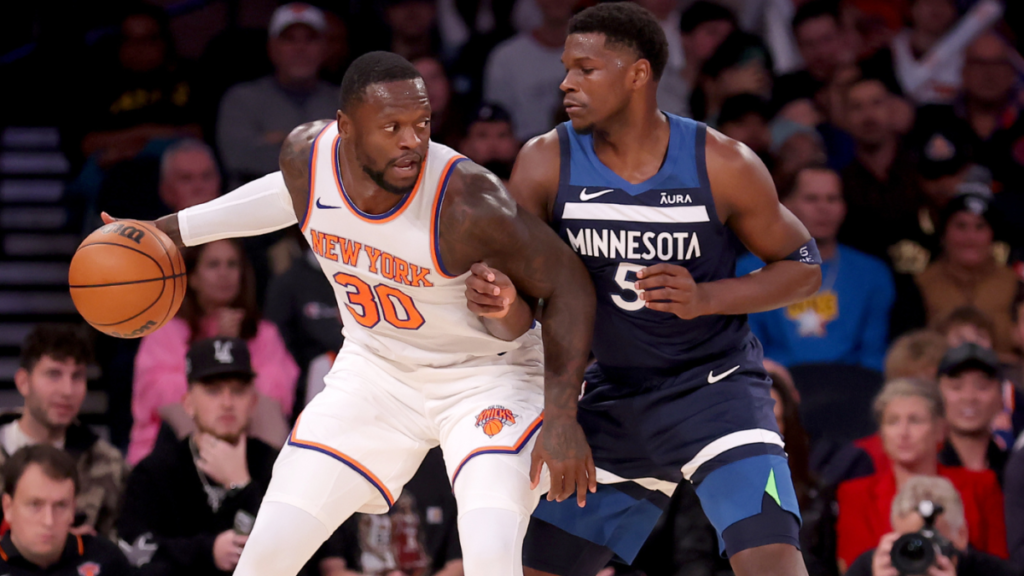The end of the Karl-Anthony Towns era in Minnesota was sort of sad. Towns didn’t want to leave the team that drafted him first overall in No. 2015, and he’d successfully reoriented his game — if not fully reinvented it — to fit next to the Minnesota Timberwolves’ franchise player (Anthony Edwards) and rim protector (Rudy Gobert). Despite all of his history there, and despite the fact that the Wolves were coming off their best season since Kevin Garnett, Latrell Sprewell and Sam Cassell were in town, last Friday they agreed to a trade that sent Towns to the New York Knicks.
Towns was shocked, and the timing was certainly surprising. On the other hand, though, the whole league knew Minnesota would eventually have to shed salary, and the Knicks (whose lead executive, Leon Rose, used to be Towns’ agent) had been linked to the All-Star big man for years. The deal brought Julius Randle and Donte DiVincenzo to Minnesota along with a protected first-round pick, improving the team’s depth in the short term and its flexibility for the foreseeable future.
The depth was appealing in part because the Wolves had let veterans Kyle Anderson and Monte Morris go in free agency. They were already counting on a rookie, Rob Dillingham, to be a contributor from Day 1, and, even after the trade, he’s not the only unproven player who projects to be in the rotation. If you view Towns’ max contract as onerous, then you might see this blockbuster as a big win, particularly after the breakout season that DiVincenzo had last year. Considering how far Minnesota got last season, though, pivoting like this is a dicey proposition, and the ownership dispute in the background makes it feel even dicier. But hey, Edwards is still there, still developing and perhaps the most captivating player on the planet. Maybe he’ll make all of this moot.
The state of play
Last year: Gobert was the league’s best defender, Reid the league’s best sixth man and Towns (arguably) the best version of himself. Edwards took another leap, leading the Wolves to a 56-26 record (No. 17 on offense, No. 1 on defense) in the regular season, and started the playoffs on such a heater that pundits lost their minds. Minnesota swept the Suns and knocked out the defending-champion Nuggets in a seven-game slugfest, but poor fourth-quarter execution doomed them against Dallas in the conference finals.
Connelly made a bold move upon arriving in Minnesota, and despite initial setbacks, he was ultimately proven right. However, after diving headfirst into win-now mode, it seems he is now taking a more cautious approach. With Rudy Gobert at 32 and Mike Conley nearing 37, this was the time to make adjustments, not overhaul the team. While DiVincenzo is a solid addition, it doesn’t justify the downgrade in the frontcourt. Julius Randle’s scoring ability doesn’t seem to fit well in the offense, as he prefers isolation touches and lacks floor spacing. The team may be deeper now, but until a different type of player is brought in, it’s hard to argue that it’s more balanced than before.
A Wolves believer defends Randle, pointing to his strong performance last January with the Knicks as evidence of his potential impact on the team. They believe Randle’s presence will benefit Anthony Edwards and help improve the offense. On the other hand, a Wolves skeptic questions Randle’s consistency and fit within the team, suggesting that starting him may not be the best option. They also raise concerns about the team’s bench depth and the potential impact of injuries on the rotation.
The Wolves believer remains optimistic about the team’s offense, pointing to Randle’s abilities as a shooter and playmaker. They believe the bench, led by players like Naz Reid and DiVincenzo, will be a key strength for the team. The Wolves skeptic, however, expresses doubts about the overall depth of the team and worries about the lack of proven rotation players beyond the starting lineup. Both agree that the team’s success may hinge on avoiding injuries early in the season and developing the bench players for a strong rotation. As we gear up for the upcoming season, I can’t help but think about the exciting competition brewing among the young players vying for Coach Finch’s trust. And let’s not forget about PJ Dozier, who has made his return to the NBA. Watching Ingles and Gobert team up once again to run pick-and-rolls is something I’m eagerly anticipating. Here are three pieces of advice I’d like to share:
1) Before you write off Ingles as past his prime, take a look at his impact on the Magic last season.
2) Don’t be quick to label the Wolves as cheapskates – consider the financial commitments and constraints they face in building their roster.
3) Embrace the unknown and be open to change. The playoffs are not happening tomorrow, and Connelly has the ability to make moves to strengthen the team, especially with young talents like Edwards on board.
To the skeptics of the Wolves’ direction, I understand your concerns. The team has made significant moves, from signing Towns to trading for Gobert and bringing in other key players. The uncertainty surrounding ownership, Gobert’s contract, and Connelly’s future adds to the apprehension. However, let’s not forget that Edwards is a rising star with room to grow. Despite the challenges, I believe that the Wolves have the potential to thrive under his leadership.

